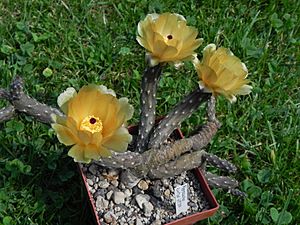Pterocactus tuberosus facts for kids
Quick facts for kids Pterocactus tuberosus |
|
|---|---|
 |
|
| In bloom | |
| Scientific classification | |
| Genus: |
Pterocactus
|
| Species: |
tuberosus
|
| Synonyms | |
|
|
Pterocactus tuberosus is a special kind of cactus that grows naturally in Argentina. It belongs to a group of cacti called Pterocactus. This plant is quite unique and has even won an important award called the Royal Horticultural Society's Award of Garden Merit. This award means it's a great plant for gardens!
Contents
About This Cactus
Pterocactus tuberosus is known for its interesting features. Like many cacti, it is adapted to dry places. It can store water in its stems and roots. This helps it survive in its native home in Argentina, where it can get very dry.
What Does It Look Like?
This cactus has stems that can grow quite long. They often spread out along the ground. It also has small, round, or oval-shaped leaves. These leaves are usually very tiny and fall off quickly. The plant also has spines, which are common for cacti.
Flowers and Fruit
When it blooms, Pterocactus tuberosus produces beautiful flowers. These flowers can be different colors, often yellow or orange. They usually open during the day. After the flowers, the plant grows small fruits. These fruits contain the seeds of the cactus.
Where Does It Grow?
Pterocactus tuberosus is native to Argentina in South America. It grows in dry, sunny areas. You might find it in rocky or sandy soils. It is well-suited to these tough conditions.
Growing Pterocactus tuberosus
Because it won the Award of Garden Merit, many people like to grow Pterocactus tuberosus in their gardens or as houseplants. It is a good choice for people who want a unique and easy-to-care-for cactus.
How to Care for It
This cactus needs a lot of sunlight. It should be placed in a spot where it gets direct sun for most of the day. It also needs soil that drains water very well. This means the water should not sit around the roots.
Watering Your Cactus
Like most cacti, Pterocactus tuberosus does not need much water. It's best to let the soil dry out completely between waterings. During winter, it needs even less water. Too much water can harm the plant.
Keeping It Safe
This cactus can handle different temperatures. However, it needs protection from very cold weather. If you live in a place with cold winters, it's best to bring it indoors.
See also
 In Spanish: Pterocactus tuberosus para niños
In Spanish: Pterocactus tuberosus para niños

